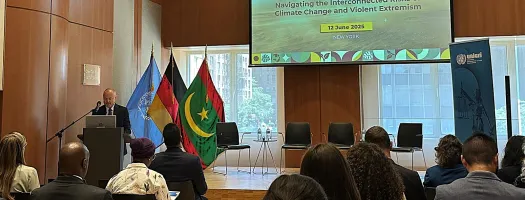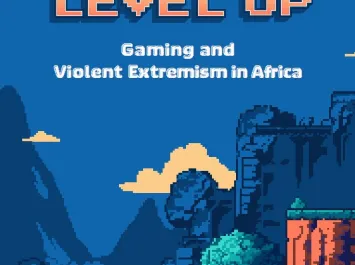On 12 June 2025, UNICRI, together with the Permanent Missions of Germany and Mauritania, convened an expert discussion at the German House in New York on the increasingly interconnected risks of climate change and violent extremism. The discussion was part of the ongoing “Climate Talks” series, organised by German Mission.
The event introduced a practical, gender-responsive methodological tool developed by UNICRI to support local and national stakeholders in Mauritania in analysing and responding to these intertwined risks. The tool enabled stakeholders to integrate climate-security and violent extremism sensitivity into policies, strategies, and initiatives – ultimately strengthening prevention and resilience in some of the world’s most environmentally and socially vulnerable regions.
Titled Analysis of Interconnected Climate Security and Violent Extremism Risks: A Practical Guide for Mauritania, the methodology provided a step-by-step approach to assessing climate security and violent extremism risks, while supporting the design of inclusive, evidence-based, and effective responses. It aimed to enhance sustainable peacebuilding and community resilience.
The briefing also served as a platform to explore the broader implications of climate and environmental change as drivers of insecurity, and the complex ways in which they interact with violent extremism. While drawing on insights from the development of the methodological tool for Mauritania, the event also examined broader strategies, lessons learned, and cross-regional perspectives relevant to West Africa and the Sahel.
A complex and urgent challenge: rising temperatures, environmental degradation, and resource scarcity have been intensifying social and economic vulnerabilities across the Sahel. In this fragile context, violent extremist groups are exploiting weakened social cohesion, loss of livelihoods, and governance gaps – challenges further exacerbated by climate-induced displacement, food insecurity, and deteriorating trust in public institutions.
Frank Jarasch, ECOSOC Ambassador, stated that: “The link between climate security and violent extremism is a crucial, yet often overlooked issue that requires urgent attention. Climate change in vulnerable regions not only threatens local populations but also has far-reaching consequences that extend beyond borders. Understanding the nexus of climate change and violent extremism is crucial, as climate-induced instability can create fertile ground for radicalization. A deeper exploration of these risks will allow us to better predict, prevent, and respond to emerging threats that could affect peace and security far beyond national borders."
“The Sahel is among the most climate-vulnerable regions in the world today. This region now stands at a crossroads, and it is our shared responsibility to act decisively and collaboratively to build a secure and sustainable future,” said Leif Villadsen, Acting Director of UNICRI.
UNICRI’s previous study on Chad had already highlighted how these dynamics were shaping people’s lives, reinforcing the need for evidence-based, integrated responses that connect environmental, security, and peacebuilding strategies.
A methodology for action: Developed through participatory consultations – including regional and national workshops held in Dakar and Nouakchott – the new UNICRI methodology offers a step-by-step approach to:
• Increase understanding of climate-related and violent extremism risks among local and national actors
• Strengthen national policies and strategies through integrated, multi-dimensional risk analysis
• Enhance cooperation among stakeholders at all levels
• Ensure inclusivity and gender-sensitivity, aligning with the Women, Peace and Security agenda
From analysis to impact: The event provided Member States and international stakeholders with an opportunity to explore innovative tools and practices for navigating climate security risks and countering violent extremism, while placing community resilience, local ownership, and inclusive approaches at the heart of sustainable peacebuilding.
Leif Villadsen, expressed his sincere appreciation to the Permanent Missions of Germany and the Islamic Republic of Mauritania for co-hosting the event, and to the German Federal Foreign Office for its generous support. He also thanked all participants for their valuable contributions to advancing the dialogue on the interlinked risks of climate change and violent extremism.



